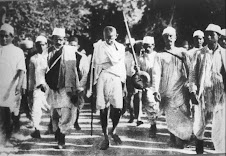After proclaiming the Declaration of Independence of India on January 26, 1930, Mahatma Gandhi came to an impasse in his political career focused on freeing India from British rule. A new anti-government campaign was imperative for achieving the secularization of India for its people; it remained unclear, however, to Gandhi what form was most appropriate for this campaign to take (Sheean 152; 156-7). During the period that followed in which he could find "no light at the end of the tunnel,"; it became apparent to Gandhi that non-violent civil disobedience would form the basis for any ensuing protest (Sheean 152; 156-7).
Beginning in February 1930, Gandhi's thoughts swayed towards the British salt tax, one of many economic improprieties used to generate revenue to support British rule, as the focal point of non-violent political protest (Ashe 301). The British monopoly on the salt tax in India dictated that the sale or production of salt by anyone but the British government was a criminal offense punishable by law (Ashe 301). Moreso than in more temperate climates, salt was invaluable to the people of India, many of whom were agricultural laborers and required the mineral for metabolism in an environment of immense heat and humidity where sweating was profuse. Occurring throughout low-lying coastal zones of India, salt was readily accessible to laborers who were instead forced to pay money for a mineral which they could easily collect themselves for free (Jack 235). Moreover, Gandhi's choice met the important criterion of appealing across regional, class, and ethnic boundaries. Everyone needed salt, and the British taxes on it had an impact on all of India.
Led by an "inner voice" during this period of strategical uncertainty, Gandhi used the British Government's monopoly of the salt tax as a catalyst for a major "Satyagraha" campaign (Copley 46-8). One of Gandhi's principal concepts, "satyagraha" goes beyond mere "passive resistance"; by adding the Sanskrit word "Agraha" (resolution) to "Satya" (Truth). For him, it was crucial that Satyagrahis found strength in their non-violent methods:
Truth (Satya) implies Love, and Firmness (Agraha) engenders and therefore serves as a synonym for force ... that is to say, the Force which is born of Truth and Love or Non-violence.... [If] we are Satyagrahis and offer Satyagraha, beleveing ourselves to be strong ... we grow stronger and stronger everyday. With our increase in strngth, our Stayagraha too becomes more effective, and we would never be casting about for an opportunity to give it up. (Gandhi 87)
Choosing the salt tax as an injustice to the people of India was considered an ingenious choice by critic Judith Brown (1977) because every peasant and every aristocrat understood the necessity of salt in everyday life (Copley 46-8). It was also a good choice because it did not alienate Congress moderates while simultaneously being an issue of enough importance to mobilize a mass following (Copley 46-8).







